Traditional practices hold deep cultural significance and preserve the heritage passed down through generations. These customs often influence various aspects of life, from rituals and celebrations to daily routines, reinforcing community identity and values. Explore the rest of the article to discover how these time-honored traditions continue to shape modern society.
Table of Comparison
| Aspect | Traditional Practices | Evidence-Based Practices |
|---|---|---|
| Instructional Approach | Teacher-centered, lecture-based | Student-centered, active learning |
| Assessment Methods | Standardized tests, memorization | Formative assessments, data-driven feedback |
| Curriculum Design | Fixed, rigid syllabus | Flexible, adaptive to learner needs |
| Use of Technology | Limited or no integration | Integrated digital tools for engagement |
| Learning Outcomes | Focus on content delivery | Focus on competency and skill development |
| Teacher Role | Information provider | Facilitator and guide |
| Decision Making | Based on tradition and intuition | Based on empirical research and data |
Introduction to Traditional and Evidence-Based Practices
Traditional practices in healthcare are rooted in cultural beliefs, long-standing customs, and experiential knowledge passed down through generations, often relying on anecdotal evidence and historical usage. Evidence-based practices (EBP) prioritize clinical research, rigorous scientific methods, and systematic reviews to inform decision-making processes and improve patient outcomes. The integration of EBP aims to replace or complement traditional methods by emphasizing effectiveness, safety, and measurable results.
Defining Traditional Practices
Traditional practices refer to methods and techniques rooted in cultural heritage, longstanding customs, or anecdotal experiences passed down through generations without formal scientific validation. These practices often rely on historical use, observational knowledge, and community consensus rather than empirical research or systematic evaluation. Understanding traditional practices involves recognizing their cultural significance and contextual application before comparing them with evidence-based approaches grounded in scientific data.
What Are Evidence-Based Practices?
Evidence-based practices (EBPs) are interventions and strategies that have been rigorously tested and validated through scientific research to ensure their effectiveness and reliability. These practices rely on empirical evidence, data-driven outcomes, and systematic reviews to guide decision-making in fields such as healthcare, education, and social services. Implementing EBPs helps improve client outcomes, reduce variability in care, and promote the use of treatments proven to deliver measurable benefits.
Historical Context and Cultural Relevance
Traditional practices have deep roots in historical contexts, often reflecting the cultural beliefs and social norms of specific communities passed down through generations. Evidence-based practices rely on scientific research and empirical data to validate their effectiveness, emphasizing reproducibility and measurable outcomes. The cultural relevance of traditional practices helps maintain heritage and identity, while evidence-based practices aim to improve health and well-being through standardized methods informed by clinical trials and systematic reviews.
Scientific Validation and Research Support
Traditional practices often rely on anecdotal evidence and cultural beliefs passed through generations, lacking rigorous scientific validation. Evidence-based practices prioritize empirical research, systematic reviews, and randomized controlled trials to ensure effectiveness and safety. Scientific validation provides a framework for evaluating interventions, improving outcomes through replicable and measurable evidence.
Benefits and Limitations of Traditional Approaches
Traditional practices offer valuable cultural insights and holistic perspectives that have been refined over generations, often emphasizing natural remedies and personalized care. However, these approaches may lack rigorous scientific validation, resulting in inconsistent outcomes and potential safety concerns. While traditional methods can promote well-being and community connection, their limitations include limited empirical evidence and challenges in standardization compared to evidence-based practices.
Advantages and Challenges of Evidence-Based Methods
Evidence-based practices offer advantages such as improved patient outcomes through the integration of current research and clinical expertise, fostering standardized care that enhances treatment consistency across diverse healthcare settings. Challenges include the need for continuous education to keep practitioners updated, limited availability of high-quality research for certain conditions, and resistance to change from professionals accustomed to traditional methods. Implementing evidence-based methods also requires adequate resources and institutional support to ensure effective application and sustainability in clinical practice.
The Role of Patient Values and Preferences
Patient values and preferences play a pivotal role in bridging traditional practices with evidence-based practices, ensuring personalized care. Integrating individual beliefs and cultural norms with scientifically validated treatments enhances patient satisfaction and adherence to care plans. Respecting these values fosters shared decision-making, improving health outcomes and aligning medical interventions with patient expectations.
Integrating Traditional and Evidence-Based Practices
Integrating traditional practices with evidence-based practices enhances healthcare by combining cultural knowledge with scientific validation, improving patient outcomes and satisfaction. Collaborative models that respect indigenous wisdom while applying rigorous clinical research foster holistic care, addressing physical, emotional, and social health dimensions. This integration requires ongoing dialogue, cultural competence, and adaptability to balance heritage with modern medical advances effectively.
Future Trends and Recommendations
Future trends in healthcare emphasize integrating evidence-based practices (EBP) with traditional methods to enhance patient outcomes and ensure culturally sensitive care. Advancements in technology and data analytics support dynamic clinical decision-making, promoting personalized treatments rooted in scientific evidence. Recommendations include ongoing professional training, fostering interdisciplinary collaboration, and leveraging real-world data to continuously update and validate best practices.
Traditional Practices Infographic

 libterm.com
libterm.com